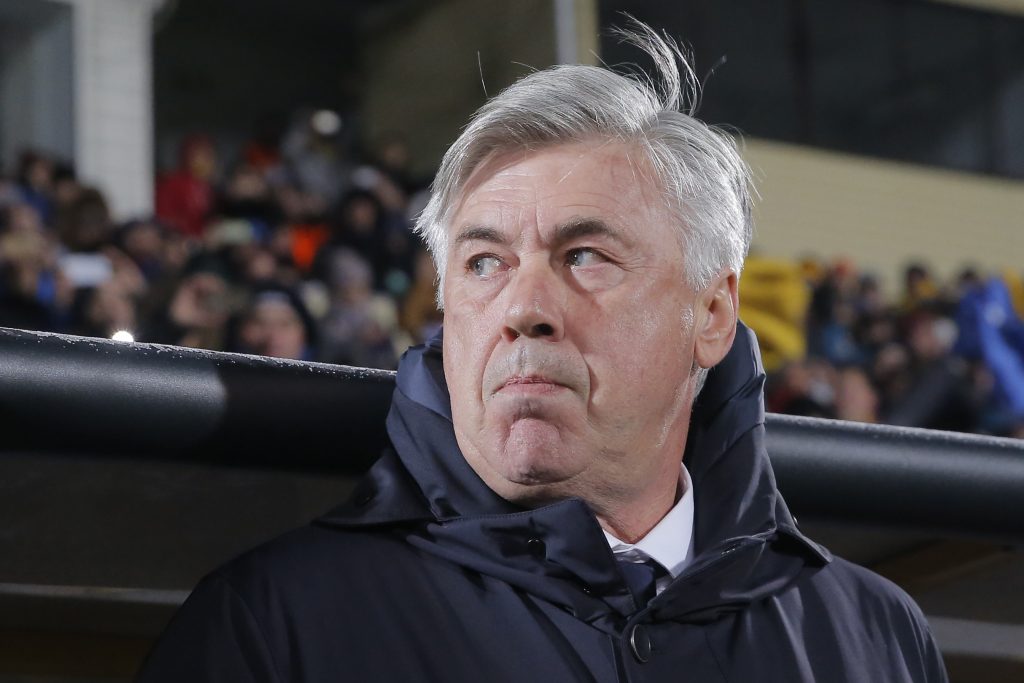Munich – When Bayern Munich came to London in March to face Arsenal, following one 5-1 victory and just about to register another, everything seemed rosy in the kingdom of FC Hollywood. Sure, their football in the Bundesliga had hardly been edge-of-the-seat stuff, but Carlo Ancelotti spoke confidently, almost bullishly, of his team before the game in the press room at the Emirates Stadium.
He talked of his side approaching their physical best and of their “real energy”. It felt like his plan to take them back to Champions League glory – the reason that he was appointed to replace Pep Guardiola in the first place – was coming together at the right time. It felt like Bayern could be becoming Ancelotti’s team at last.
Once we walked up into the stands to see Bayern go through an innocuous 15-minute warm-up in the chill of a north London evening, it became clear that was perhaps less the case than the Italian would like to believe. The players immediately organized themselves into a high-tempo rondo – the piggy-in-the-middle one-touch game so beloved of Guardiola that set the tone in his reign from the very beginning. For all the world’s media, the indelible mark left on the squad by the Catalan tactician was plain to see.
It is living in the shadow of Guardiola that has ultimately cost Ancelotti his post at Bayern. The club’s management always knew there would be a drop-off in intensity when Guardiola – to their disappointment – left, and there was even the suggestion in some quarters that might not be a bad thing. Working under Guardiola is demanding and some of the squad, notably Franck Ribéry, had become tired of his micro-management.
Yet those players who breathed a sigh of relief at seeing the back of his three-line whip perhaps came to crave its return. They went from being kept on a short leash to being allowed to run around the park for hours. Still, as Bayern have underachieved this season, there has been a lot of dishonest revision of Ancelotti’s attributes, or apparent lack thereof.
Some have even gone as far as to suggest he does not do anything. This is plainly nonsense – ask Paris Saint-Germain, who mourned his loss for a prolonged period after his 2013 departure. Ancelotti showed PSG what being an elite club was all about, getting the players into the habit of recuperating and spending time with each other at Camp des Loges – just as the great Milan teams did at Milanello – and persuading the likes of Thiago Silva and Zlatan Ibrahimovic that the club were for real. “Paris lui doit tellement” – Paris owe him so much – said the headline in Wednesday’s L’Equipe, on the eve of that ultimately ruinous defeat at Parc des Princes. For those who thought Ancelotti has no eye for detail, there was even the anecdote that he ordered ball-boys for training in his time at PSG to minimize the dead time between exercises.
Tactical nuance, however, clearly is not his thing, and this began to frustrate the German champions’ squad – and those upstairs, who had seen Guardiola create a discernible Bayern brand of football. International observers may keep coming back to Guardiola’s failure to take Bayern back to the Champions League final in his three-year spell, but locals will remind you the football that the team produced in that time was out of this world.
Such peaks were the product of no let-up. That is not Ancelotti’s style, and Karl-Heinz Rummenigge knew that when he appointed him. The lack of dazzle in Bundesliga action did not cause any initial alarm – if underwhelming domestically meant having plenty left in the tank for the final stages of the Champions League, then that was a price that Bayern were prepared to pay to allow Ancelotti to work his magic.
The majesty with which they overwhelmed Arsenal was all too brief, though, and the awful second half performance in the quarter-final, first leg against Real Madrid was the beginning of the end for the coach. Rummenigge may have spent a long time bemoaning the officiating in the second leg at the Bernabéu but deep down, he knew what he saw at the Allianz Arena the week before – his team, faced with a setback against a high-quality opponent for one of the first times that season, and with absolutely no answer to it.
Accordingly, Bayern went into this season with what amounted to a lame duck head coach, with the hope that he would keep everything shipshape until Julian Nagelsmann could arrive with a new energy next summer. A series of disjointed performances, a pertinent loss to Nagelsmann’s Hoffenheim and scarcely-concealed rebellion in public comments by Thomas Müller, Robert Lewandowski and, after the humbling in Paris, Arjen Robben has brought things to a head sooner than Rummenigge or Uli Hoeness would like.
Whether right now is the right moment for Nagelsmann is questionable – he is a prodigious talent but still only 30. In the meantime, Bayern have turned once again to Jupp Heynckes, appointing him manager for the fourth time since 1987. During his last stint, he led Bayern to win the treble in 2013. In his fourth stint, Heynckes will not only be required to bring in new ideas to the club, but he will have to quickly put a lid on any dressing-room unrest.
Ancelotti will walk away with his reputation largely undamaged, and that is fair. He was maybe the right type of coach for Bayern at completely the wrong moment.
The Guardian Sport
